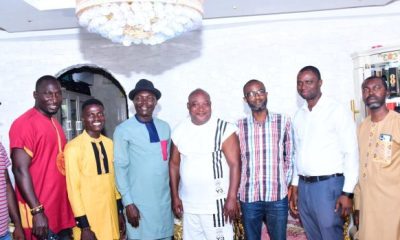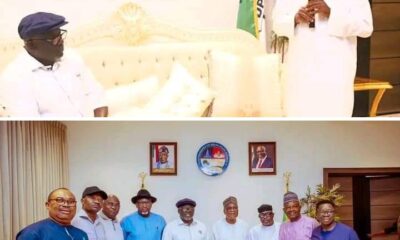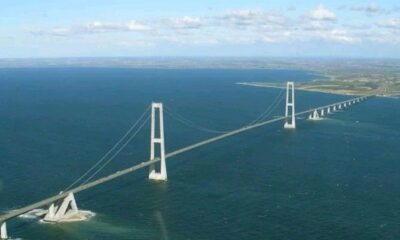Editorial
NIGER-DELTA AVENGERS (NDA): AVENGING ON THE FRAUDULENT AND NEO-COLONIZED NIGERIAN STATE TO “MEND” THE INJUSTICE DONE THE NIGER-DELTA OVER THE DECADES IN ORDER TO BRING ABOUT FREEDOM.
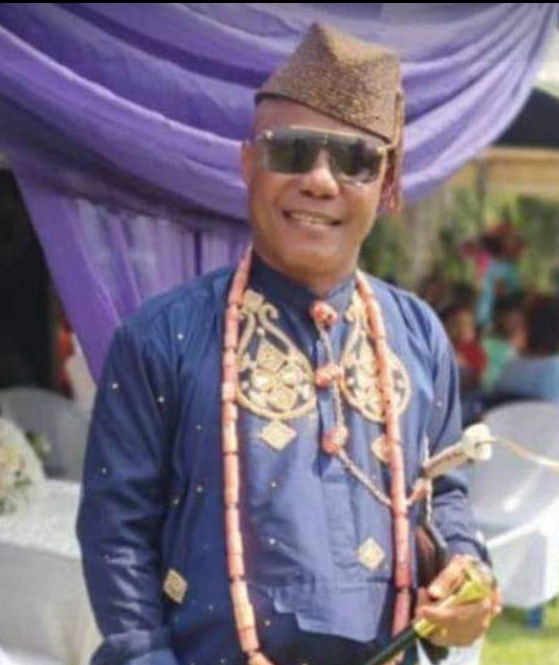
NIGER-DELTA AVENGERS (NDA):
AVENGING ON THE FRAUDULENT AND NEO-COLONIZED NIGERIAN STATE TO “MEND” THE INJUSTICE DONE THE NIGER-DELTA OVER THE DECADES IN ORDER TO BRING ABOUT FREEDOM.
In the Bible book of Matthew 22 : 21, Jesus Christ told the Pharisees, their disciples and Herodians, “Render therefore unto Caesar the things which are Caesar’s; and unto God the things that are God’s – King James Version,
On his own, former reggae maestro and rastafarian, late Peter Markin -Tosh, in one of his musical albums titled “Equal Rights”, sang as follows:
“Everyone is crying out for peace yes,
None is crying out for justice.
Everyone is crying out for peace yes,
Non is crying out for justice.
I don’t want no peace,
I need equal rights and justice”.
In line with the above quotes, when Groundnut, Cocoa and Coal were the economic mainstay of the defunct Northern, Western and Eastern regions respectively in the defunct first republic, the proceeds from these resources were used to develop the aforementioned regions. Similarly, when the defunct Midwestern region was created, though to weaken late Chief Obafemi Awolowo’s political empire, the new region’s bills were paid from the proceeds of Palm-oil, Rubber and Timber, that were in abundance or commercial quantity in the region.
Conversely, when Crude-Oil was discovered in commercial quantity at Oloibiri, an Ijaw town in the defunct Eastern Region and present day Bayelsa State of the Niger-Delta (South-south geopolitical zone), the music of fiscal federalism or resource control changed. Crude-oil became an exclusive natural resource of the Federal Government and it’s proceeds collected, controlled and shared at the discretion of the Federal Government to itself, the States and Local Government Councils. What a daylight robbery! Over the decades, Crude-oil and Gas have been discovered all over the Niger-Delta, and they have since become the economic mainstay of Nigeria, paying or accounting for over 80% of her bills.
While derivation was 50% in the defunct first republic during the Groundnut, Cocoa, Coal, Palm-oil, Timber, Tin and other natural economic resources era, military adventurers abolished derivation on their incursion into governance. After decades of peaceful protests and agitations by the Niger-Deltans for fair share of their God-given Oil wealth, a paltry 1.5% derivation was introduced by President Alhaji Shehu Aliyu Usman Shagari’s government of the defunct second republic (1979 -1983), later increased to 3% by the General Ibrahim Badamasi Babangida’s bloodthirsty and dictatorial government of 1986 -1993, and now 13%, as agreed by the oppressive and repressive three most populated tribes of Hausa-Fulani, Yoruba and Ibo in the General Abdulsalami Abubakar led dictatorial military imposed 1999 Constitution.
Although, the Federal Government has since established interventionist agencies like Niger-Delta Development Commission (NDDC), Ministry of Niger-Delta Affairs (MNDA) and Presidential Amnesty Programme (PAP) for the development of the Niger-Delta.
Unfortunately, these agencies are merely established to deceive the people and the international community, as they are not adequately funded to achieve desired goals or at least develop the Niger-Delta like Northern and Western Nigeria.
To buttress my claim, I had that only a paltry N41 Billion is allocated to the Niger-Delta Development Commission (NDDC) for infrastructural and human capital development in the Niger-Delta (nine Oil producing states) in this year’s budget. Similarly, Ministry of Niger-Delta Affairs (MNDA) and the Presidential Amnesty Programme (PAP) are allocated with a paltry N19 Billion and N20 Billion respectively. In other words, the total sum allocated to the three interventionist agencies to develop the nine Niger-Delta (oil producing states) is a paltry N80 Billion.
It is sad to note that Nigerians who are not from the Niger-Delta and the international community, see this paltry N80 Billion allocated to the three interventionist agencies to develop the Niger-Delta (nine oil producing states) from the multi-trillion Petrodollars accruing to the Federation Account from the Niger-Delta Oil and Gas, as very much enough. Whereas, Ecological Fund, which is mainly spent to fight desertification in Northern Nigeria, while the Niger-Delta and Southeastern Nigeria erodes away, is allocated N800 Billion in this years budget. As usual, the budgetary allocations to each of the three northern geopolitical zones of northwest, northeast and north-central, as well as southwest is 100% more than what is allocated to the Niger-Delta States (South-south geopolitical zone).
Besides, summing up the monthly allocation from the federation account through Oil and Gas proceeds to Kano State and her 46 Local Government Councils alone in Northern Nigeria could be equal to, if not more than the allocation going to three or more Niger-Delta States, such as Ondo, Edo, Cross River and Bayelsa, and their Local Government Areas put together.
To further appreciate the point I am making, few weeks back, Lagos State Government announced N844 Billion to build the forth Lagos Mainland Bridge, which will be sponsored with the Niger-Delta Petrodollars going to Lagos State as allocation from the Federation Account. Painfully, the criminal Nigerian State has refused to construct the about 30 kilometres road from Warri to Forcados, an Oil and Gas rich coastal town by the Atlantic Ocean, which hosts Nigeria’s Oil Export Terminal with lots of Oil-wells and a very big Oil Tank Farm. A road that has been proposed over four decades ago!
Main while, with the establishment of the Northeast Development Commission, a geopolitical zone deliberately destroyed by their terrorist natives for no cogent reason(s), you sure won’t be surprised seeing this criminal Nigerian State and her Rulers allocating a quarter of the national budget, which is implemented with the Petrodollars from the Niger-Delta to the Northeast development.
Apart from being the forth most populated tribe in the contraption called Nigeria, Ijaw land has the highest Oil, Gas and other natural resources concentration in her bowel than any other land in Nigeria. Sadly, the Ijaw ethnic nation was balkanized into the defunct Western, Eastern and Midwestern Regions. As against the wishes of the Ijaws, the subsequent creation of states by military adventurers like Yakubu Gowon, Ibrahim Badamasi Babangida and late Sanni Abacha, further balkanized the Ijaw ethnic nation into six states of Ondo, Edo, Delta, Bayelsa, Rivers and Akwa-Ibom.
In line with the satanic agenda of the Hausa-Fulani neo-colonialists and their Yoruba stooges against the Ijaw ethnic nation, the Ijaws are now minority even in the Niger-Delta States, a geopolitical zone they are in majority, save for Bayelsa and Rivers States. Very disheartening!
Undoubtedly, this has adversely affected development of the Ijaw ethnic nation in no small measure, knowing that government is the highest spender in all the third world countries the world over.
It may interest the international community, particularly, the civilized democracies like the United States of America (USA), United Kingdom (UK), France, Canada, Russia, Japan, China, etcetera, to know that the Ijaw ethnic nation with her abundant human and natural resources, particularly, Oil and Gas, which accounts for about 80% of Nigeria’s income and pays her bills, is not seen as part of Nigeria by the Nigerian State and her Rulers. This is predicated upon the following reasons:
- That, 99.99% of the entire Ijaw land is not connected to other parts (ethnic nations) of Nigeria by road network, in spite of the fact that all roads in Nigeria, including federal, states and local government council roads are constructed with the Petrodollars from the bowel of Ijaw land;
- That, it’s only the Ijaw ethnic nation that is not connected to Nigeria’s national grid, in spite of the fact that Nigeria’s power and energy are generated mostly from the abundant Gas reserves in Ijaw land. The Minister of Power, Works and Housing, Babatude Raji Fashola confirmed this claim when he said that, “Out of Nigeria’s 26 Power Plants, 23 are run with Gas from the Niger-Delta, hence there is power outage in the country with Niger-Delta Avengers (NDA) blowing up Oil installations;
- That, there was no single higher institution of learning in the length and breadth of Ijaw land till the late Diepreye Solomon Peters Alamienyeseigha (PhD.), former Governor of Bayelsa State/Governor-General of the Ijaw ethnic nation established the Bayelsa State Government owned Niger-Delta University at Wilberforce Island, Bayelsa State;
- That, there was no single federal higher institution of learning in the entire Ijaw land till Nigeria’s former President Goodluck Jonathan (PhD.) established a federal university at Otuoke, Bayelsa State, along with nine Universities in the North, two in the Southwest and one in Southeast Nigeria, making every state in Nigeria have a federal university;
- That, the Maritime University established by the former President , Goodluck Jonathan (PhD.) at Okerenkoko, an Ijaw coastal town by the Atlantic Ocean in the Oil and Gas rich Gbaramatu Kingdom of Warri Southwest Local Government Area, Delta State, is at the brink of cancellation by the Muhammadu Buhari led federal government;
- That, there is no single Teaching or Specialist Hospital in the whole Ijaw land, in spite of frequent outbreak of diseases (epidemic) in Ijaw land due to Oil exploration, drilling and spillages, which contaminates and pollutes the environment. Whereas, there are lots of Teaching and Specialist Hospitals in the Northwest, Northeast, North-central, Southwest and Southeast, whose bills are paid with the Petrodollars from the bowel of Ijaw land;
- That, 80% of the Oil blocks in Ijaw land have been shared or allocated to the Hausa-Fulanis, who are in the arid and rocky/mountainous Northern Nigeria, where there is no Oil. The remaining 20% is allocated to the Yoruba and Ibo ethnic groups of Southwest and Southeast, leaving non for the Ijaws, on whose land majority of the Oil and Gas is naturally deposited;
- That, all the management staff, senior, middle and junior cadre of Oil and Gas workers in Ijaw land and their company offices far away in Lagos and Abuja are exclusively occupied or reserved for the Hausa-Fulanis, Yoruba and Ibos, leaving the Ijaws with a paltry 0.01% casual work with Oil Servicing Companies;
*That, as a result of Oil exploration, exploitation, spillages, etcetera, the entire Ijaw land has been contaminated and polluted to the extent that , the ecosystem, including marine life has been seriously damaged, and crops too can’t grow again;
- Human life is not exempted in the damage done the ecosystem of Ijaw land, as the average human lifespan which used to be between 70 years to 80 years is now between 45 years to 50 years.
The marginalization, degradation, oppressive and repressive acts meted the Ijaw ethnic nation by the criminal Nigerian State and her Rulers are countless. However, for your benefit, the reader, I leave the rest evil the Ijaws have been forcefully subjected to over the decades for you to imagine.
Corollary to the above, the Niger-Delta Avengers (NDA) who are a group of highly educated young Niger-Deltans, with no hope about their future and confidence in the criminal Nigerian State are agitating for total freedom (resource control) rather than a fair share of their God-given resources by blowing-up Oil facilities. Obviously, this is as a result of the failure of peaceful protests their parents embarked on in the past but where brutally murdered by the criminal Nigerian State and her Rulers. The brutal murderer of Major Isaac Jasper Adaka Boro after using him to defend the territorial integrity of Nigeria during the Nigerian civil war, from the coastal axis, Kenule Saro-Wiwa and the Ogoni nine and lots of others which are still ongoing is very fresh in the memory of the average Niger-Deltan.
From the modus operandi of the Niger-Delta Avengers (NDA), which is mainly on crippling the Nigerian Economy, than killing innocent and defenceless people with reckless abandon, like the criminal Nigerian State, Boko Haram (a terrorist group in Northern Nigeria) and Muhammadu Buhari’s Fulani kinsmen terrorists, masquerading as Herdsmen, it is crystal clear that they are fighting to free the entire Niger-Delta from the shackles of neo-colonialism and eminent Islamization by the fraudulent Nigerian State, the Hausa-Fulani Jihadists/Terrorists of Northern Nigeria and their Yoruba stooges of Southwest Nigeria.
Therefore, any Niger-Deltan, particularly, Ijaw man, who is against the Niger-Delta Avengers (NDA) is under mental slavery, which is the worse form of slavery. This form of slavery gives “you the illusion of freedom, makes you trust, love and defend your oppressor(s), while making an enemy of those who are trying to free you or open your eyes”.
Ordinarily, “People don’t want to hear the truth because they don’t want their illusions destroyed” – Friedrich Nietzsche.
On his part, George Orwell said that, “The further a society drifts from the truth, the more it will hate those who speak it”.
In situations like what is happening now in Nigeria , as it affects the Niger-Delta, particularly, Ijaw land, Emiliano Zapata has this to say: That, “If there is no justice for the people , let there be no peace for the government”.
Main while, Malcolm X said that, “Nobody can give you freedom. Nobody can give you equality and justice. If you are a man, you take it”.
Therefore, the Niger-Delta Avengers (NDA), who are avenging on the criminal Nigerian State and her Rulers in order to bring about equal rights and justice for the Niger-Deltans are patriots that should be held in high esteem, encouraged and supported. In fact, all Niger-Deltans should be proud to be part of the Niger-Delta struggle for freedom, than condemning the freedom fighters.
After all, in the eyes of Muhammadu Buhari, Boko Haram members are good people and very dear to Northern Nigeria. Hence, he said in ThisDay Newspaper that, “Military offensive against Boko Haram, anti-north”. A northern terrorist group that has brutally killed over 20,000 innocent and defenceless Nigerians with reckless abandon?
Similarly, the Minister of Interior, General Abdulrahman Dambazou, said in Channels Television that, “Deployment of military to combat Herdsmen menace was not an option because the situation has not overwhelmed the police yet”. Another northern terrorists group that has brutally killed over 3,000 innocent and defenceless Nigerians in cold-blood, like their Boko Haram counterparts?
In view of the above, I make bold to say that, military offensive against Niger-Delta Avengers (NDA) is anti-Niger-Delta, particularly, the Ijaw ethnic nation, which has turned battle field for emancipation of the Niger-Delta.
To the oppressive and repressive criminal Nigerian State and her Rulers, even the Holy Quran say in Sura 42 verse 41 that, “All those that fight when oppressed incur no guilt, but Allah shall punish the oppressors”.
GET UP, STAND UP,
STAND UP FOR YOUR RIGHTS.
GET UP, STAND UP,
DON’T GIVE-UP TO FIGHT…Peter Markin-Tosh.
NIGER-DELTA! NIGER-DELTA!! NIGER-DELTA!!!
FREEDOM IS COMING SOON!
- Hon. Edumogiren Austin is a political analyst and public commentator.
Editorial
Is Dubai A Country? Inside the Seven Kingdoms of the United Arab Emirates
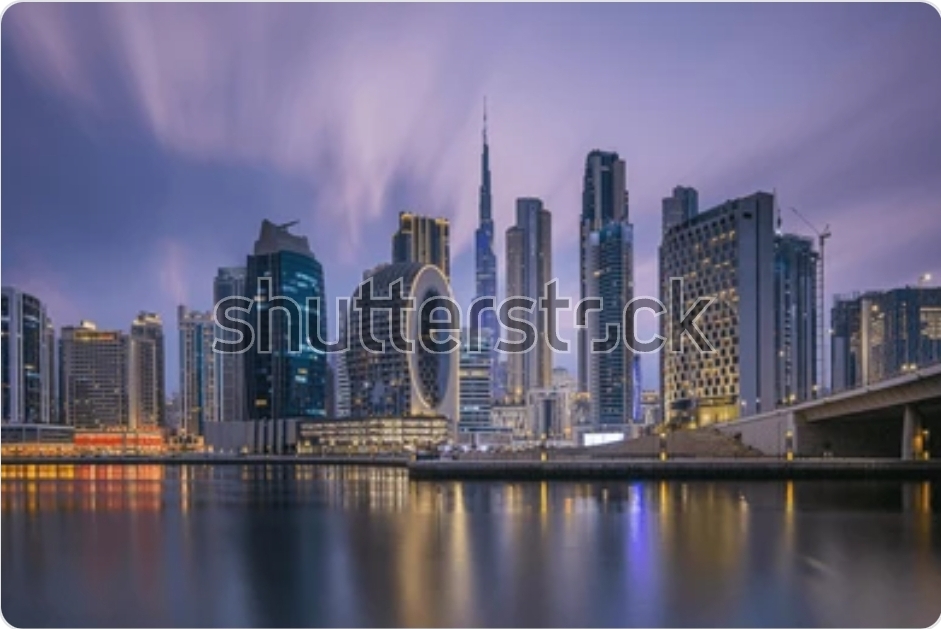
By: Editorial Team
The United Arab Emirates (UAE), often hailed as a beacon of modern development in the Middle East, is a federation of seven emirates—each with its own distinct history, ruler, and cultural identity. Since its unification in 1971, the UAE has stood as a rare example of how traditional monarchies can collaborate to build a stable and globally respected nation.
At the heart of the federation lies Abu Dhabi, the capital and largest emirate, known for its vast oil wealth and political influence. The Al Nahyan family, which leads Abu Dhabi, has played a central role in shaping the UAE’s national vision and foreign policy. The current President of the UAE traditionally comes from this emirate, underscoring its leadership within the union.
Dubai, the shining star of the federation, represents ambition and innovation. Under the leadership of the Al Maktoum family, Dubai has transformed from a desert outpost into a global hub for finance, tourism, and technology. Its breathtaking skyline, led by the Burj Khalifa, has become a symbol of Arab progress and resilience.
Moving beyond the two powerhouses, Sharjah distinguishes itself as the cultural and educational capital of the UAE. Led by the Al Qasimi family, it has preserved the emirates’ artistic heritage while promoting academic excellence through its numerous universities and museums.
The smaller emirates-Ajman, Umm Al-Quwain, Ras Al Khaimah, and Fujairah-each add unique character and strength to the federation. Ajman, the smallest, thrives on trade and manufacturing; Umm Al-Quwain offers a peaceful charm along its quiet shores; Ras Al Khaimah, nestled against the Hajar Mountains, is known for its natural beauty and growing industrial base; and Fujairah, facing the Gulf of Oman, plays a strategic maritime role in the region’s economy.
Despite their differences in size and resources, the seven emirates remain bound by shared values, mutual respect, and visionary leadership.Their collective success story reflects not only unity but also the ability to balance tradition with progress.
Over five decades after its founding, the UAE continues to prove that cooperation among monarchies can yield a modern, forward-looking state-one that honors its past while boldly stepping into the future. The federation’s model of governance offers an enduring lesson in leadership, stability, and nation-building in a region often defined by division.
Photo Credit: shuterstock
Editorial
The Modern Avatar of Agadagba
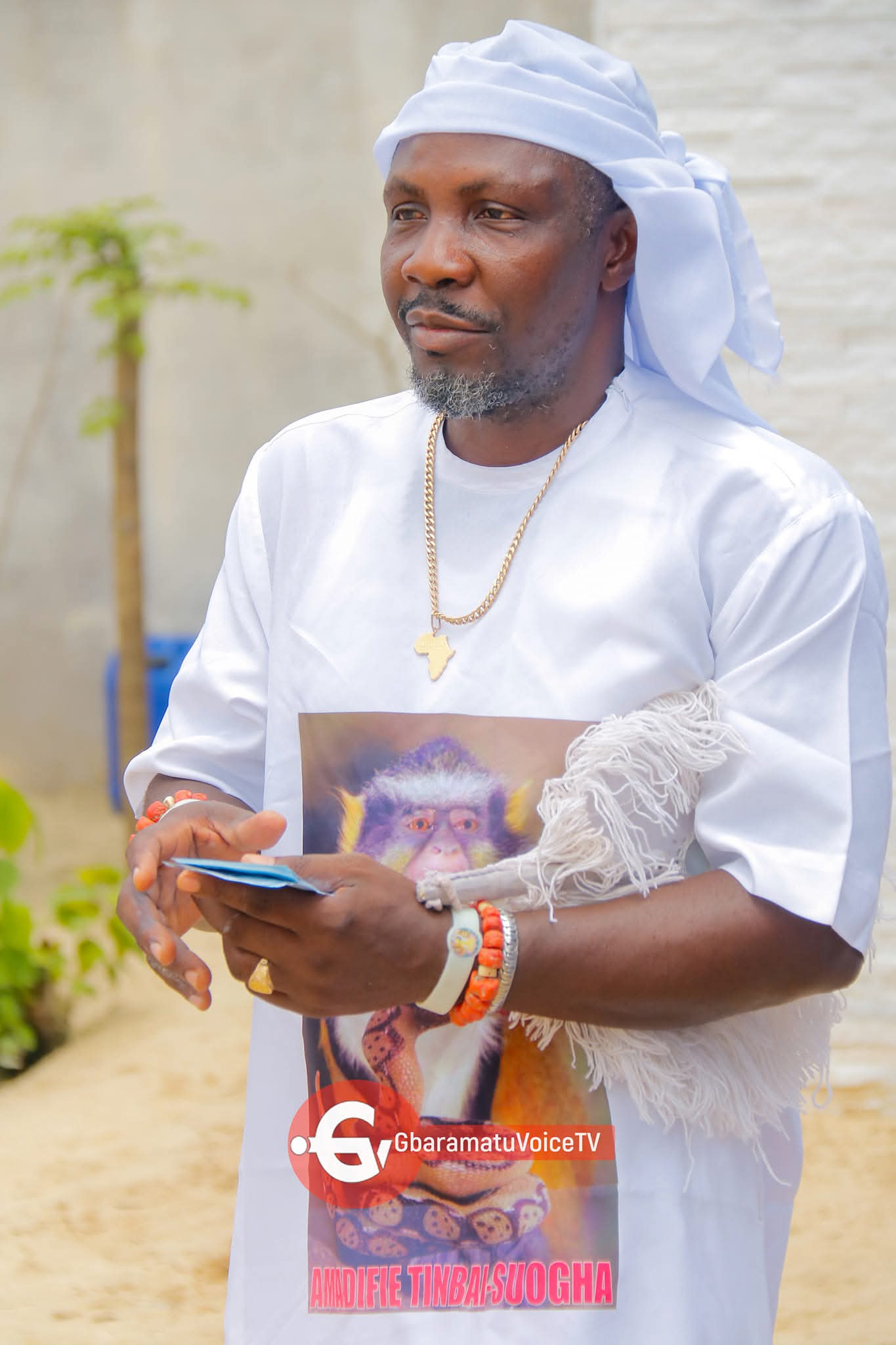
Editorial – IduwiniVoice
Government Oweizide Ekemupolo is 4th Century descendant of The progenitors of the Oru tribe, the archetypal Ijaws, who settled in the central Niger Delta and over time, who developed and spread to the entire Niger Delta. He his an embodiment of the ancient and modern ways and forces of the ijaw ancestral greats, ruled my ancient spiritual and human laws, a man and a superman.
Prior to 1600 AD, the Ijaws first and formally formed city-states on their island of abode in Central Niger Delta. The city-states were named Agadagba-bou, Isomou-bou, and Opugla-bou. The popular city-state was called Agadagba-bou, which, according to history, flourished for 400 years until it got abandoned in 1050 CE. That was the period Ijaw people migrated within the central Niger Delta and spread to the Western and Eastern Niger Delta.
Agadagba-bou, Isomou-bou, and Upugla-bou, which represented the Ijaw civilization at the historical island, long before it was named Wilberforce Island, had cultural, spiritual, linguistic, and occupational homogeneity.
They were all worshippers and believers of the sky God. The sky God that the Ijaws call today, even from ancient times, is Egbesu. It is believed that the Wilberforce Island was known as a forest named after Agadagba, the most powerful chief priest of Egbesu, who also doubled as the military general of the Izon nation.
Agadagba-bou, as a nomenclature, derives its bearing from Agadagba, the chief priest and generalissimo who once reigned on the Wilberforce Island. It is certain that the island hosted the Ijaw nation long before the time of Agadagba because Agadagba was appointed a chief priest and military general during his time by a potentate ruler of Ijaw nation.
In the primordial mists of time, Agadagba, the illustrious military general and chief priest of Egbesu, strode forth from the hallowed grounds of Agadagbabou, his footsteps echoing through the annals of Ijaw history. This revered figure, a paragon of martial prowess and spiritual wisdom, embodied the dual essence of his people, wielding the sword and the sacred staff with equal aplomb. The whispers of the ancients tell us that Agadagba’s reign predated the 1600 AD, a bygone era when the Ijaw nation thrived in harmony with the rhythms of the Niger Delta.
Agadagbabou, the cradle of Ijaw civilization, slumbers beneath the weight of centuries, its sacred soil serving as the final resting place of the ancestral spirits. Here, the venerable dead lie entombed, their ethereal essences lingering, awaiting the supplications of their descendants. Alas, the diaspora of the Ijaw people has occasioned a lamentable disconnection from these archetypal forebears, a severance that has hindered the unfettered flow of ancestral blessings, those numinous benedictions that are the birthright of every society.
For it is an immutable truth that the progress of a people is inextricably linked to the approbation of their ancestors.
The epochs have passed, and Agadagba’s terrestrial sojourn has long since drawn to a close, yet the imperishable essence of this legendary figure endures, awaiting reification in the mortal coil. Behold, 4.18 CENTURIES AFTER AGADAGBA, PRICESELY FOUR CENTURIES PLUS, in this our age, Government Oweizide Ekemupolo, a worthy scion of the Ijaw nation, has arisen, invested with the sacred mantle of Egbesu’s chief priest and military general. The symmetries are striking, the correspondences unmistakable: Ekpemupolo stands forth as the avatar of Agadagba, a reincarnation of the primordial hero, reborn to reclaim the lost patrimony of his people.
As we gaze upon Ekpemupolo, we behold the rekindled flame of Agadagba’s indomitable spirit, a fiery essence that refuses to be extinguished. The mythopoeic imagination whispers secrets in our ear, intimating that this modern-day embodiment of Ijaw valour and spirituality is, in truth, a Priest of the ancient mysteries, a hieratic vessel ordained to restore the pristine glory of Agadagbabou and reestablish the vital link between the living and the ancestral dead.
Thus, the epicycle of time turns full circle, as the reincarnated Agadagba, in the person of Ekpemupolo, strides forth to reclaim his rightful place within the sacred precincts of Ijaw tradition. The word is a witness to his spiritual and endeavours which catalyse a renaissance of the Ijaw spirit, rekindling the ancestral fires that burn bright within the collective unconscious of this venerable people, and guiding them toward a future illuminated by the radiant glow of their archetypal forebears.
As Tompolo’s efforts continue to bear fruit, Nigeria’s economic landscape is transformed, and the nation’s people reap the benefits of his tireless endeavours. His legacy will forever be etched in the annals of Nigerian history, a shining testament to the power of visionary leadership and unwavering dedication to the nation’s progress.
Benedict Binebai is a Professor of African Literature, a Social Conscientizer, and a Critic of outstanding repute.
(c) IduwiniVoice
Editorial
A Magnificent Gesture of Philanthropy: Tompolo’s Landmark Donation 10 Billion Naira to Delta State Government
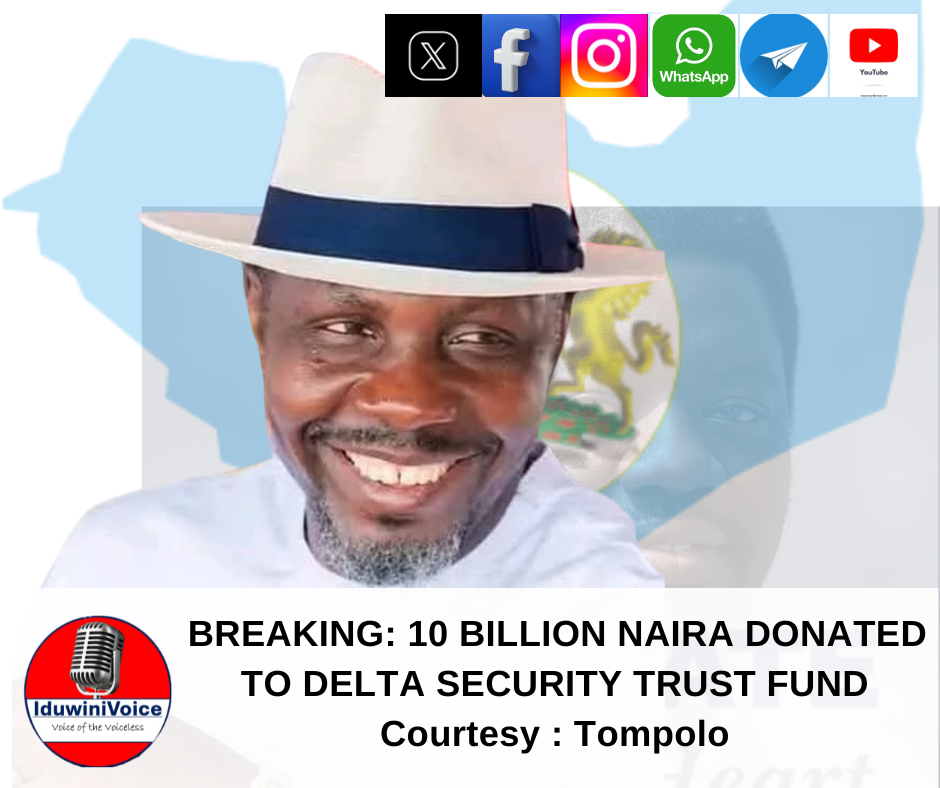
Editorial
Chief Tompolo’s most generous bestowal of 10 billion naira upon the Delta State Security Fund is a magnificent affirmation of his steadfast devotion to the betterment of his beloved homeland. This munificent act not only underscores his profound solicitude for the well-being of the citizenry, but also serves as a sonorous confirmation of his dedication to the edification of the nation.
This magnificent donation bespeaks Chief Tompolo’s perspicacious vision for a Delta State wherein the territorial integrity, individual safety, and proprietary rights of its inhabitants are zealously safeguarded and protected. For it is an immutable truth that security constitutes a fundamental pillar for peaceful and progressive human existence, and a people that get security right are a people who enjoy prosperity, stability, and tranquillity. His largesse constitutes a clarion call to all right-thinking Nigerians to emulate his exemplary conduct, thereby contributing to the realisation of a more stable and prosperous nation.
As a private individual, Chief Tompolo’s remarkable munificence distinguishes him as a true architect of society, a philanthropist of discerning taste, and a stalwart champion of both private and public institutions. His actions evince a profound comprehension of the intricate nexus between security, patriotism, and nation-building, and serve as a shining exemplar for others to follow.
In the pantheon of benevolent figures, Chief Tompolo’s deed resonates with the selfless generosity of mythical beings like Prometheus, who defied the gods to bestow the gift of fire upon humanity, or Hercules, who cleansed the Augean stables to bring prosperity to the land. Like these fabled heroes, Chief Tompolo’s philanthropy emanates a profound sense of altruism, illuminating the path towards a brighter future for the people of Delta State.
By this singular act, Chief Tompolo has floated a most compelling narrative that the Ijaw nation, and indeed all ethnic groups in Nigeria, have a critical role to play in shaping the country’s destiny. His donation is a puissant statement that the resources and talents of Nigerians, regardless of their region or ethnicity, can be harnessed to forge a more united, secure, and prosperous nation, and that the Ijaw people, in particular, are committed to contributing to the construction of a brighter Nigerian picture.
Chief Tompolo’s unprecedented gesture inaugurates a new paradigm of leadership for the Ijaw nation, one that radiates an unparalleled aura of generosity, vision, and selflessness. This luminous exemplar of leadership kindles a guiding light, illuminating a path towards a more prosperous, equitable, and enlightened future for the Ijaw people, and serves as a resplendent model for leaders across Nigeria and beyond, demonstrating that true greatness is measured by the ability to uplift and empower one’s community.
Benedict Binebai is a Professor of African Literature, Public Speaker, and a renowned critic of intellectual acclaim.
(c) IduwiniVoice

